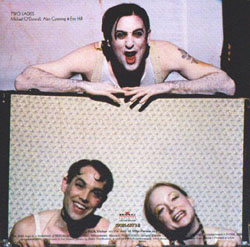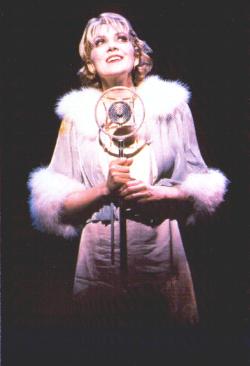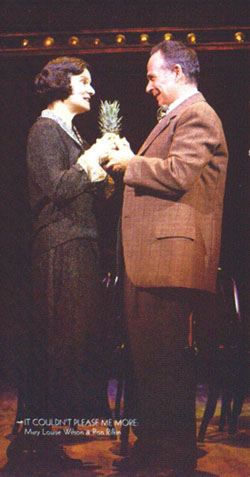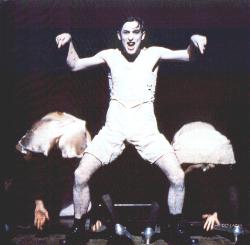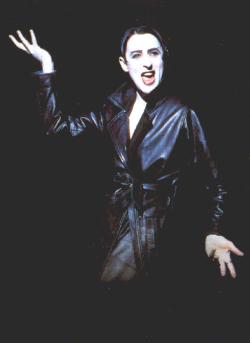CABARET has always worked.
So it shouldn't have been a big surprise when the Roundabout Theatre Company's revival of the landmark musical opened to sensational reviews, cheering audiences and sell-out business. Yet it was. This new production (directed by Sam Mendes and choreographed and co-directed by Rob Marshall) achieved something that few revivals are capable of, but that each one aspires to: making the audience feel as if they are discovering a new work and seeing it for the first time.
CABARET began as literature, "Berlin Stories" by Christopher Isherwood. These were adapted by John Van Druten for the stage as "I Am a Camera" starring Julie Harris, which won her the 1952 Tony Award for Best Actress. A film version of the play was made in 1955 starring Miss Harris, Laurence Harvey & Shelly Winters. The story of sleazy Berlin on the cusp of the 1930s -- and in particlular of a not-particularly-talanted-but-always-mersmerizing singer named Sally Bowles -- has never failed to capture critics and audiences alike.
In 1966, when it was announced that Harold Prince would produce and direct a musical version of John Van Druten's "I Am a Camera" with a book by Joe Masteroff (with whom Prince has worked on "She Loves Me") and a score by the young team of John Kander & Fred Ebb (whose previous Broadway show "Flora the Red Menace" had been produced by Prince) no one could have foreseen that a landmark Broadway musical was in the making.
That dazzling production -- designed by Boris Aronson and starring Lotte Lenya, Jack Gilford, Jill Haworth (as Sally), Bert Convy, Peg Murray, Edward Winter and Joel Grey (as the Emcee) -- was a theatrical force to be reckoned with. It won 8 Tony Awards and ran for 1,166 performances. The show was a smash in London where the cast was headed by Judi Dench (as Sally), Lila Kedrova, Kevin colson & Barry Dennen (as the Emcee). Everywhere that the show played around the world, it proved to be a sensation.
The film version, at the dawn of the free-wheeling 70's (1972) -- starring Liza Minnelli, Michael York & Joel Grey and directed by Bob Fosse -- won 8 Oscars. The film streamlined the show's dual plots and brought a more authenic "divine decadence" to the proceedings. Due to the film's worldwide success and celebrated
performances, its imagery has left an indelible mark on the consciousness of fans the world over.
How can you compete with that?
In December of 1993, at the intimate Donmar Warehouse in London, director Sam Mendes staged a production starring Jane Horrocks (as Sally) and Alan Cumming (as the Emcee) that became the sensation of that London theater season.
In March of 1996, after an extended search for an appropriate venue in Hew York City, the Roundabout Theatre Company brought Mr. Mendes' CABARET (now co-directed and choreographed by Rob Marshall) to Broadway starring Natasha Richardson and with Mr. Cumming repeating his West End success. And this time the cheering was louder and longer that ever.
What makes this production so different?
The environment. We are in a seedy nightclub in Berlin in the 1930's, thanks to Robert Brill's extraordinary physical re-imagining of the space, now known as the Kit Kat Klub in the former Henry Miller's Theater (where T.S. Eliot's "The Cocktail Party" played in 1950.) The audience is seated at tables and bar service is available. The actors appear in seamy, sleazy costumes designed by William Ivey Long, and the entire room is engulfed in bold, smoky lighting by Peggy Eisenhouer & Mike Baldassari.
The actors. Not just sensational Natasha Richarson, the mesmerizing Alan Cumming, the heart-breaking performances of Ron
Rifkin and Mary Louise Wilson, the charm of John Benjamin Hickey, the seemingly endless veratility of Michele Pawk and the benignly sinister Denis O'Hare, but the extraodinary ensemble who double as the show's orchestra. If they aren't dancing or acting, the chances are that they are on a platform above the stage playing Michael Gibson's flavorful orchestrations (and David Krane's inspired dance arrangements) under the exuberant baton of Patrick Vaccariello.
The staging. All of the elements of this production have been fused together with the clear vision of Sam Mendes and Rob Marshall into what Vincent Canby in the New York Times calls "A stunning revival [that] generates the excitement of something brand new. Scary and hypnotic - This is a production to keep you spellbound."
However, we all know that there has to be something truly remarkable for a creative team to re-imagine in the first place, and that leads us to the show itself. The book by Joe Masteroff has always been able to balance the sentimental with the sensational. And last but certainly not least, the extra-ordinary score by John Kander & Fred Ebb. Can any of us imagine a world without the title song to CABARET? In this, their second musical together, Kander & Ebb created a musical theater score for the ages. You know the songs by heart; by rights there shouldn't be a sense of discovery about this score; and yet, with this cast, in this production, discovery is one of the chief emotions we feel. Rarely have the emotional depths of the characters and the music been so thoroughly explored. So sit back, pour yourself a drink and discover, as if for the first time, CABARET.
- Bill Rosenfield
|
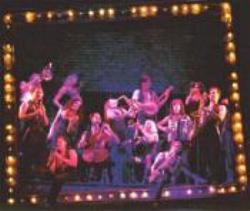
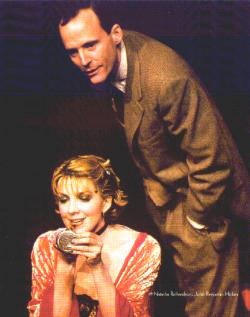

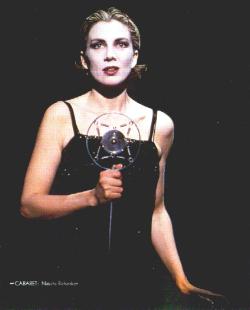

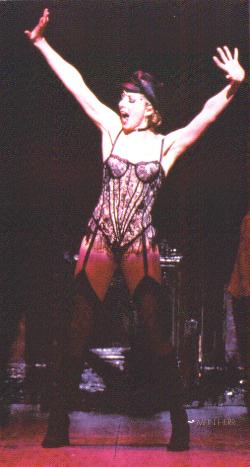

|

